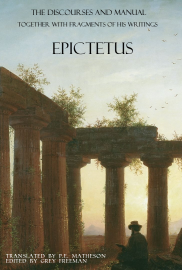Discourses of Epictetus
 The purpose of this edition of the Discourses of Epictetus is to provide a free, copywrite-unencumbered, and fully formatted eBook version of this work. Many excellent and inexpensive print versions already exist, and I will not be adding another. Likewise, I will not be posting this to any commercial eBook sellers as there are plenty of those as well, and that would not be free which would defeat the entire purpose.
The purpose of this edition of the Discourses of Epictetus is to provide a free, copywrite-unencumbered, and fully formatted eBook version of this work. Many excellent and inexpensive print versions already exist, and I will not be adding another. Likewise, I will not be posting this to any commercial eBook sellers as there are plenty of those as well, and that would not be free which would defeat the entire purpose.
I have started with the P.E. Matheson translation, published in 1916 and hosted at Sacred Texts, due to its relatively modern language and superior formatting. In particular, I was concerned with preserving and integrating a linked table of contents, as well as bookmarks, footnotes, and indexes that add so much to the reading of this important work. Most of my modifications to this book were constrained to formatting required for viewing with an eBook reader. Some footnotes were added or clarified, particularly when referring to words no longer in wide usage.
I have limited changes to the actual text to the removal of print and scan\OCR artifacts, punctuation fixes, plus a handful of archaic words that were substituted with modern spellings to add clarity for the contemporary reader. The original British standard spellings were otherwise left intact. Spelling changes are noted in more detail in the appendices. Alternate translations from the George Long version (also in the public domain) have been used in some places where the words as provided were not clear, either due to transcription errors or shifts in meaning. Such substitutions were both rare and duly footnoted. To summarize, my intent here was to “clean up” the manuscript, not to “re-write” it. In places, the line between the two was fuzzy, but I did my best to remain faithful to both the author and the translation.
One more note: Despite all the edits I have made, there is still much in this transcript that offends my inner grammarian. And likely yours, as well. Unfortunately, every edit I made took the book further away from the original intent of the translator who was the only one, of the two of us, who could read the original Latin. If you see something that you would have expected an editor to fix, I probably really wanted to.
Epictetus was a Greek Stoic philosopher (b. 55-d. 135 CE). Born a slave in Hierapolis, Phyrgia, in what is today Turkey, Epictetus lived in Rome until exiled to Nicopolis in Northern Greece. It was in exile that Epictetus' disciple Arrian took down his Discourses. As we have no actual writings of Epictetus, Arrian's notes are the only remnants of his philosophy.
P.E. (Percy Ewing) Matteson MBE (23 January 1859 – 11 May 1946) was an honorary fellow at New College Oxford, and a prolific writer and translator. Some of his works include National ideals (1915), Holy Russia and Other Poems (1918), The Growth of Rome (1922) and translations of several Greek and Stoic writings.
